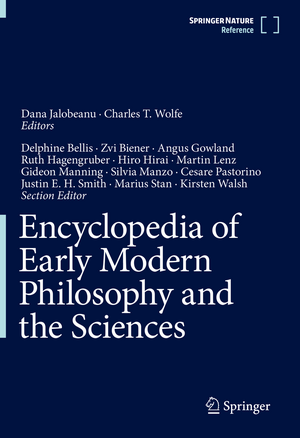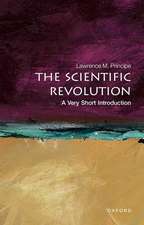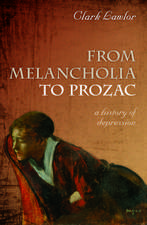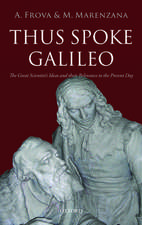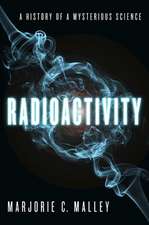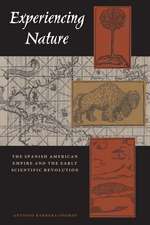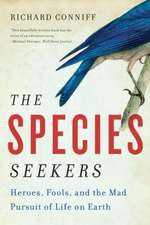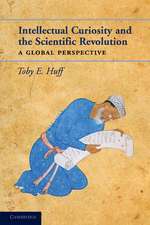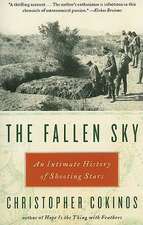Encyclopedia of Early Modern Philosophy and the Sciences: Encyclopedia of Early Modern Philosophy and the Sciences
Editat de Dana Jalobeanu, Charles T. Wolfe Delphine Bellis, Zvi Biener, Justin E. H. Smith, Angus Gowland, Ruth Hagengruber, Hiro Hirai, Martin Lenz, Gideon Manning, Silvia Manzo, Cesare Pastorino, Marius Stan, Kirsten Walshen Limba Engleză Hardback – 30 iul 2022
Editorial Board
EDITORS-IN-CHIEF
- Dana Jalobeanu University of Bucharest, Romania
- Charles T. Wolfe Ghent University, Belgium
ASSOCIATE EDITORS
- Delphine Bellis University Nijmegen, The Netherlands
- Zvi Biener University of Cincinnati, OH, USA
- Angus Gowland University College London, UK
- Ruth Hagengruber University of Paderborn, Germany
- Hiro Hirai Radboud University Nijmegen, The Netherlands
- Martin Lenz University of Groningen, The Netherlands
- Gideon Manning CalTech, Pasadena, CA, USA
- Silvia Manzo University of La Plata, Argentina
- Enrico Pasini University of Turin, Italy
- Cesare Pastorino TU Berlin, Germany
- Lucian Petrescu Université Libre de Bruxelles, Belgium
- Justin E. H. Smith University de Paris Diderot, France
- Marius Stan Boston College, Chestnut Hill, MA, USA
- Koen Vermeir CNRS-SPHERE + Université de Paris, France
- Kirsten Walsh University of Calgary, Alberta, Canada
Preț: 4646.23 lei
Preț vechi: 6113.46 lei
-24% Nou
Puncte Express: 6969
Preț estimativ în valută:
889.01€ • 928.31$ • 734.14£
889.01€ • 928.31$ • 734.14£
Carte tipărită la comandă
Livrare economică 11-17 aprilie
Preluare comenzi: 021 569.72.76
Specificații
ISBN-13: 9783319310671
ISBN-10: 3319310674
Pagini: 1200
Ilustrații: XXXVI, 2243 p. 170 illus., 85 illus. in color. In 3 volumes, not available separately.
Dimensiuni: 178 x 254 mm
Greutate: 6.08 kg
Ediția:1st ed. 2022
Editura: Springer International Publishing
Colecția Springer
Seria Encyclopedia of Early Modern Philosophy and the Sciences
Locul publicării:Cham, Switzerland
ISBN-10: 3319310674
Pagini: 1200
Ilustrații: XXXVI, 2243 p. 170 illus., 85 illus. in color. In 3 volumes, not available separately.
Dimensiuni: 178 x 254 mm
Greutate: 6.08 kg
Ediția:1st ed. 2022
Editura: Springer International Publishing
Colecția Springer
Seria Encyclopedia of Early Modern Philosophy and the Sciences
Locul publicării:Cham, Switzerland
Cuprins
Mechanical philosophy.-Newtonianism.-Chemistry, alchemy.-Mind, soul and logic.-Metaphysics and laws of nature.-Methods of reading, writing and research.-Spaces for the production of knowledge, practical knowledge.-Aristotelianism and late scholasticism.-Controversies.-Life Sciences 1: Medicine.-Life Sciences 2: Natural history.-Mechanics, mixed mathematics.-Natural Magic, curiosity.-Experimental philosophy.-Women in philosophy and sciences.
Notă biografică
Dana Jalobeanu is lecturer in Philosophy at the Faculty of Philosophy, University of Bucharest, and member of the Center for the Logic, History and Philosophy of Science (CELFIS) and of the research center Foundations of Early Modern Thought (FEM), University of Bucharest. She is the executive editor of the journal Societate si politica and co-editor of the Journal of Early Modern Studies. She is general secretary of the International Society for Intellectual History and member of the steering committee of HOPOS. She is one of the initiators and co-organizers, since 2001, of the Princeton-Bucharest Seminar in Early Modern Philosophy (12 editions since 2001). Her research interests include the emergence of science and experimental philosophy from Bacon to Newton, from the perspective of integrated HPS. She is principal investigator of a 4-year research grant in natural history of science (2011–2015) and the Romanian coordinator of a European Research Council grant (The medicine of the mind and natural philosophy in early modern England) held jointly by The Warburg Institute and New Europe College (Bucharest). She has co-edited (with Peter Anstey) Vanishing Matter and the Laws of Nature: Descartes and Beyond, Routledge: London, 2011. Her recent articles include “Learning from Experiment: Classification, Concept Formation and Modeling in Francis Bacon’s Experimental Philosophy,” Revue Roumaine de philosophie 57 (1) (2013) 75–93; “Idolatry, Natural History and Spiritual Medicine: Francis Bacon and the Neo-Stoic Protestantism of the Late Sixteenth Century,” Perspectives on Science, 21: 2012: 207–226; “Francis Bacon’s Natural History and the Senecan Natural Histories of Early Modern Europe,” Early Science and Medicine, 17: 1–2, 2012, pp. 197–229; “Bacon’s Brotherhood and Its classical Sources,” in Francis Bacon and the Birth of Technology, edited by Claus Zittel, Gisela Engel, Romano Nanni, Intersections 11/(2008), Brill, Vol. I, 197–230Charles T. Wolfe is a Professor in the Department of Philosophy, Université de Toulouse-2 Jean-Jaurès, and co-director, ERRAPHIS. He works primarily in history and philosophy of the early modern life sciences, with a particular interest in materialism and vitalism. He is the author of Materialism: A Historico-Philosophical Introduction (2016), La philosophie de la biologie avant la biologie: une histoire du vitalisme (2019), and Lire le matérialisme (2020) and has edited or co-edited volumes on monsters, brains, empiricism, biology, mechanism and vitalism, and on figures including Locke, Priestley, and Canguilhem. He is co-editor of the book series “History, Philosophy and Theory of the Life Sciences” (Springer). Papers available at: https://univ-tlse2.academia.edu/CharlesWolfeAssociate Editors
Delphine Bellis is Assistant Professor in History and Philosophy of Science at Paul Valéry University in Montpellier, France. Her research interest is primarily in the history of early modern philosophy and science, in particular optics and theories of space and matter, with a focus on Descartes and Gassendi. She has published papers on Descartes, Regius, and Gassendi, and participates in the edition of Descartes’ complete correspondence edited by Roger Ariew, Erik-Jan Bos, and Theo Verbeek, to be published by Oxford University Press. She co-edited Space, Imagination and the Cosmos from Antiquity to the Early Modern Period (Springer, 2018 with Frederik Bakker and Carla Rita Palmerino) and is a member of the editorial board of Studium. Tijdschrift voor Wetenschaps- en Universiteitsgeschiedenis / Revue d’Histoire des Sciences et des Universités.
Zvi Biener is Associate Professor of Philosophy at the University of Cincinnati. His research focuses on the nature of applied mathematical knowledge in the 17th and 18th centuries, and issues surrounding data analytics in the 21st century. He is the co-editor with Eric Schliesser of Newton and Empiricism (Oxford University Press, 2014) and the author of essays on early-modern mathematization such as "Hobbes on the Order of Sciences: A Partial Defese of the Mathematization Thesis" (Southern Journal of Philosophy, 2016), "De Gravitatione Reconsidered: The Changing Significance of Experimental Evidence for Newton's Metaphysics of Space" (Journal of the History of Philosophy, 2017), and "Newton's Regulae Philosophandi" (The Oxford Handbook of Newton, E. Schliesser and C. Smeenk, eds. Oxford University Press, forthcoming).
Angus Gowland is Reader in Intellectual History at University College London. He is the author of The Worlds of Renaissance Melancholy: Robert Burton in Context (Cambridge University Press, 2006), and the editor of Robert Burton's Anatomy of Melancholy (Penguin Classics, forthcoming).
Ruth Hagengruber is Professor of Philosophy, specializing in philosophy of Economics and Information Science. She is Head of Philosophy at the University Paderborn and Director of the Center for the History of Women Philosophers and Scientists https://historyofwomenphilosophers.org. In 2006 she founded the teaching and research areas Philosophy and Computing and History of Women Philosophers and Scientists. She received the award for Teaching Philosophy in the Media (2014) and Online Teaching Philosophy goes MOOC (2016) and became a Lifetime member of the International Association of Computing and Philosophy (I-ACAP) in 2011, as well as a member of the Advisory Board of the Munich Center for Technology in Society (Technical University, Munich). In 2015 she was awarded the Wiener Schmidt Prize of the Society for Cybernetics and Systems Theory, with publications in the field, suchas: The Computational Turn, Past, Presents, Future, coedited with Charles Ess (2011), Philosophy, Computing and Information Science, with Uwe Riss (2014). She first published on the history of women philosophers with German translations from Anne Conway, Emilie Du Châtelet, Marie de Gournay, Olympe de Gouges, Mary Wollstonecraft, Margret Cavendish in Klassische philosohische Texte von Frauen (1998). Subsequent publications include Émilie Du Châtelet between Leibniz and Newton (2011), History of Women's Ideas, coedited with Karen Green (The Monist, 2015); Women in Early Phenomenology on Social Ontology. On Edith Stein, Gerda Walter and Hedwig Conrad Martius (with Sebastian Luft, 2018); Emilie Du Châtelet und die deutsche Aufklärung (with Hartmut Hecht, 2019), and as guest editor with Sarah Hutton, a special issue of British Journal of the History of Philosophy on 'Women Philosophers in Early Modern Philosophy' (BJHP vol. 27, no.4, 2019). Forthcoming: Methodological Reflections on Women’s Contribution and Influence in the History of Philosophy (with Sigridur Thorgeirsdottir, 2019)
Hiro Hirai holds a Ph.D. in philosophy and history of science from the University of Lille 3 (France). He is a research fellow at the Italian Academy for Advanced Studies, Columbia University. He has published widely in Renaissance and early modern natural philosophy, medicine and alchemy, including Le concept de semences dans les théories de la Renaissance (2005) and Medical Humanism and Natural Philosophy (2011). He is currently preparing his third monograph on Renaissance philosophy, science and medicine.
Martin Lenz is professor of history of philosophy at Groningen University. He specialises in medieval and early modern philosophy. Before joining the philosophy faculty at Groningen University in 2012, he studied Philosophy, Linguistics and German Literature in Bochum, Budapest and Hull (M.A. in 1996; PhD in 2001 in Bochum) and spent his postdoctoral period in Cambridge, Tübingen and Berlin (Habilitation in 2009). Weboage: http://rug.academia.edu/MartinLenz
Please also visit: Handling Ideas: A blog on (writing) philosophy
Gideon Manning is Research Associate Professor of Early Modern Studies at Claremont Graduate University. He has previously taught at the University of Pittsburgh and served on the faculty at the College of William and Mary and the California Institute of Technology. In 2013 he was the recipient of a “New Directions Fellowship” from the Andrew W. Mellon Foundation, allowing me to enroll as a medical student at the Keck School of Medicine of the University of Southern California. He is a past Associate Editor of HOPOS: The Journal of the International Society for the History of Philosophy of Science and the author, most recently, of “Descartes and Medicine” which appeared in the Oxford Handbook of Descartes and Cartesianism, and “Circulation and the New Physiology” which is forthcoming in The Cambridge History of Philosophy of the Scientific Revolution. His current projects include to the reception history of Descartes and Cartesianism and, more generally, recovering the importance of medicine to early modern philosophy and science as a vehicle for expanding the sources and voices included in historical scholarship surrounding the so-called “scientific revolution.”
Silvia Manzo is research scholar of the National Research Council (CONICET), Professor at the Department of Philosophy and Director of the Doctoral Program in Philosophy of the National University of La Plata (Argentina). She works primarily on metaphysical aspects of late Renaissance and early modern science, and on the historiography of philosophy.
Her recent publications include: “The debates on experience and empiricism in nineteenth-century France”, special issue of Perspectives of Science 27:5 (September-October, 2019) co-edited with Delphine Antoine-Mahut; “Monsters, laws of nature, and teleology in Late-Scholastic textbooks” in Contingency and natural order in early modern science, R. Garau and P. Omodeo, eds., Boston Studies in History and Philosophy of Science, Springer, 2019; “Reading skepticism historically. Academic skepticism, acatalepsia and the Fall of Adam in Francis Bacon”, in S. Charles and P. Junqueira Smith (eds.), Academic Scepticism in early-modern Philosophy, Springer, 2016; “From attractio and impulsus to ‘Motion of Liberty’. Rarefaction and Condensation in Cardano, Francis Bacon, Glisson and Hale” in C. Muratori and G. Paganini, eds., Early Modern Philosophers and the Renaissance Legacy, Springer, 2016; “Certainty, laws and facts in Francis Bacon's jurisprudence”, Intellectual historyreview,24, 4 (2014), 457 – 478. She is currently working on a project on the Renaissance and early modern history of the laws of nature, in addition to several projects devoted to historiography and new narratives of early modern philosophy (reasssesment of the empiricism-rationalism divide, women philosophers, etc.)
Cesare Pastorino is a researcher in the Institute of Philosophy & History of Literature, Science & Technology at Technical University Berlin with Ph.D. in history and philosophy of science at Indiana University (2011), with a dissertation on Francis Bacon, experiment, and early Stuart culture. Afterwards, he was a fellow at the Science History Institute in Philadelphia, a postdoctoral fellow at the Berlin Center for the History of Knowledge and a senior research fellow at the Vossius Center for History of Humanities and Sciences (University of Amsterdam). He also worked for several years in two leading digital history projects: The Chymistry of Isaac Newton and The Newton Project. His work focuses on the origins and development of early modern experimentation (broadly conceived) and practical knowledge, with an interdisciplinary approach. Currently, he is the principal investigator in the 3-year project grant “The Weight of Things. Quantification of Matter and the Exchange of Technical and Learned Knowledge in Early Modern Europe,” financed by the German Research Foundation (DFG).
Justin E. H. Smith is professor of history and philosophy of science at the University of Paris, and author, most recently, of Irrationality: A History of the Dark Side of Reason (Princeton University Press, 2019), and translator, with Rodolfo Garau, of Pierre Gassendi's Syntagma Philosophicum (Oxford University Press, forthcoming).
https://www.jehsmith.com/
Marius Stan is associate professor at Boston College. He works in history and philosophy of science, with a focus on mathematical physics from Galileo to Cauchy. Much of his work is at https://philpeople.org/profiles/marius-stan.
Kirsten Walsh is a Philosophy Lecturer in the Department of Sociology, Philosophy and Anthropology (SPA) at the University of Exeter, UK. Her research concerns the emergence of early modern experimental philosophy, Newton’s methodology in relation to that tradition, and historiographical and pedagogical issues concerning the history of philosophy. She is a member of the Otago School and contributes to their project blog, ‘Early Modern Experimental Philosophy’ (https://blogs.otao.ac.nz/emxphi/).
Delphine Bellis is Assistant Professor in History and Philosophy of Science at Paul Valéry University in Montpellier, France. Her research interest is primarily in the history of early modern philosophy and science, in particular optics and theories of space and matter, with a focus on Descartes and Gassendi. She has published papers on Descartes, Regius, and Gassendi, and participates in the edition of Descartes’ complete correspondence edited by Roger Ariew, Erik-Jan Bos, and Theo Verbeek, to be published by Oxford University Press. She co-edited Space, Imagination and the Cosmos from Antiquity to the Early Modern Period (Springer, 2018 with Frederik Bakker and Carla Rita Palmerino) and is a member of the editorial board of Studium. Tijdschrift voor Wetenschaps- en Universiteitsgeschiedenis / Revue d’Histoire des Sciences et des Universités.
Zvi Biener is Associate Professor of Philosophy at the University of Cincinnati. His research focuses on the nature of applied mathematical knowledge in the 17th and 18th centuries, and issues surrounding data analytics in the 21st century. He is the co-editor with Eric Schliesser of Newton and Empiricism (Oxford University Press, 2014) and the author of essays on early-modern mathematization such as "Hobbes on the Order of Sciences: A Partial Defese of the Mathematization Thesis" (Southern Journal of Philosophy, 2016), "De Gravitatione Reconsidered: The Changing Significance of Experimental Evidence for Newton's Metaphysics of Space" (Journal of the History of Philosophy, 2017), and "Newton's Regulae Philosophandi" (The Oxford Handbook of Newton, E. Schliesser and C. Smeenk, eds. Oxford University Press, forthcoming).
Angus Gowland is Reader in Intellectual History at University College London. He is the author of The Worlds of Renaissance Melancholy: Robert Burton in Context (Cambridge University Press, 2006), and the editor of Robert Burton's Anatomy of Melancholy (Penguin Classics, forthcoming).
Ruth Hagengruber is Professor of Philosophy, specializing in philosophy of Economics and Information Science. She is Head of Philosophy at the University Paderborn and Director of the Center for the History of Women Philosophers and Scientists https://historyofwomenphilosophers.org. In 2006 she founded the teaching and research areas Philosophy and Computing and History of Women Philosophers and Scientists. She received the award for Teaching Philosophy in the Media (2014) and Online Teaching Philosophy goes MOOC (2016) and became a Lifetime member of the International Association of Computing and Philosophy (I-ACAP) in 2011, as well as a member of the Advisory Board of the Munich Center for Technology in Society (Technical University, Munich). In 2015 she was awarded the Wiener Schmidt Prize of the Society for Cybernetics and Systems Theory, with publications in the field, suchas: The Computational Turn, Past, Presents, Future, coedited with Charles Ess (2011), Philosophy, Computing and Information Science, with Uwe Riss (2014). She first published on the history of women philosophers with German translations from Anne Conway, Emilie Du Châtelet, Marie de Gournay, Olympe de Gouges, Mary Wollstonecraft, Margret Cavendish in Klassische philosohische Texte von Frauen (1998). Subsequent publications include Émilie Du Châtelet between Leibniz and Newton (2011), History of Women's Ideas, coedited with Karen Green (The Monist, 2015); Women in Early Phenomenology on Social Ontology. On Edith Stein, Gerda Walter and Hedwig Conrad Martius (with Sebastian Luft, 2018); Emilie Du Châtelet und die deutsche Aufklärung (with Hartmut Hecht, 2019), and as guest editor with Sarah Hutton, a special issue of British Journal of the History of Philosophy on 'Women Philosophers in Early Modern Philosophy' (BJHP vol. 27, no.4, 2019). Forthcoming: Methodological Reflections on Women’s Contribution and Influence in the History of Philosophy (with Sigridur Thorgeirsdottir, 2019)
Hiro Hirai holds a Ph.D. in philosophy and history of science from the University of Lille 3 (France). He is a research fellow at the Italian Academy for Advanced Studies, Columbia University. He has published widely in Renaissance and early modern natural philosophy, medicine and alchemy, including Le concept de semences dans les théories de la Renaissance (2005) and Medical Humanism and Natural Philosophy (2011). He is currently preparing his third monograph on Renaissance philosophy, science and medicine.
Martin Lenz is professor of history of philosophy at Groningen University. He specialises in medieval and early modern philosophy. Before joining the philosophy faculty at Groningen University in 2012, he studied Philosophy, Linguistics and German Literature in Bochum, Budapest and Hull (M.A. in 1996; PhD in 2001 in Bochum) and spent his postdoctoral period in Cambridge, Tübingen and Berlin (Habilitation in 2009). Weboage: http://rug.academia.edu/MartinLenz
Please also visit: Handling Ideas: A blog on (writing) philosophy
Gideon Manning is Research Associate Professor of Early Modern Studies at Claremont Graduate University. He has previously taught at the University of Pittsburgh and served on the faculty at the College of William and Mary and the California Institute of Technology. In 2013 he was the recipient of a “New Directions Fellowship” from the Andrew W. Mellon Foundation, allowing me to enroll as a medical student at the Keck School of Medicine of the University of Southern California. He is a past Associate Editor of HOPOS: The Journal of the International Society for the History of Philosophy of Science and the author, most recently, of “Descartes and Medicine” which appeared in the Oxford Handbook of Descartes and Cartesianism, and “Circulation and the New Physiology” which is forthcoming in The Cambridge History of Philosophy of the Scientific Revolution. His current projects include to the reception history of Descartes and Cartesianism and, more generally, recovering the importance of medicine to early modern philosophy and science as a vehicle for expanding the sources and voices included in historical scholarship surrounding the so-called “scientific revolution.”
Silvia Manzo is research scholar of the National Research Council (CONICET), Professor at the Department of Philosophy and Director of the Doctoral Program in Philosophy of the National University of La Plata (Argentina). She works primarily on metaphysical aspects of late Renaissance and early modern science, and on the historiography of philosophy.
Her recent publications include: “The debates on experience and empiricism in nineteenth-century France”, special issue of Perspectives of Science 27:5 (September-October, 2019) co-edited with Delphine Antoine-Mahut; “Monsters, laws of nature, and teleology in Late-Scholastic textbooks” in Contingency and natural order in early modern science, R. Garau and P. Omodeo, eds., Boston Studies in History and Philosophy of Science, Springer, 2019; “Reading skepticism historically. Academic skepticism, acatalepsia and the Fall of Adam in Francis Bacon”, in S. Charles and P. Junqueira Smith (eds.), Academic Scepticism in early-modern Philosophy, Springer, 2016; “From attractio and impulsus to ‘Motion of Liberty’. Rarefaction and Condensation in Cardano, Francis Bacon, Glisson and Hale” in C. Muratori and G. Paganini, eds., Early Modern Philosophers and the Renaissance Legacy, Springer, 2016; “Certainty, laws and facts in Francis Bacon's jurisprudence”, Intellectual historyreview,24, 4 (2014), 457 – 478. She is currently working on a project on the Renaissance and early modern history of the laws of nature, in addition to several projects devoted to historiography and new narratives of early modern philosophy (reasssesment of the empiricism-rationalism divide, women philosophers, etc.)
Cesare Pastorino is a researcher in the Institute of Philosophy & History of Literature, Science & Technology at Technical University Berlin with Ph.D. in history and philosophy of science at Indiana University (2011), with a dissertation on Francis Bacon, experiment, and early Stuart culture. Afterwards, he was a fellow at the Science History Institute in Philadelphia, a postdoctoral fellow at the Berlin Center for the History of Knowledge and a senior research fellow at the Vossius Center for History of Humanities and Sciences (University of Amsterdam). He also worked for several years in two leading digital history projects: The Chymistry of Isaac Newton and The Newton Project. His work focuses on the origins and development of early modern experimentation (broadly conceived) and practical knowledge, with an interdisciplinary approach. Currently, he is the principal investigator in the 3-year project grant “The Weight of Things. Quantification of Matter and the Exchange of Technical and Learned Knowledge in Early Modern Europe,” financed by the German Research Foundation (DFG).
Justin E. H. Smith is professor of history and philosophy of science at the University of Paris, and author, most recently, of Irrationality: A History of the Dark Side of Reason (Princeton University Press, 2019), and translator, with Rodolfo Garau, of Pierre Gassendi's Syntagma Philosophicum (Oxford University Press, forthcoming).
https://www.jehsmith.com/
Marius Stan is associate professor at Boston College. He works in history and philosophy of science, with a focus on mathematical physics from Galileo to Cauchy. Much of his work is at https://philpeople.org/profiles/marius-stan.
Kirsten Walsh is a Philosophy Lecturer in the Department of Sociology, Philosophy and Anthropology (SPA) at the University of Exeter, UK. Her research concerns the emergence of early modern experimental philosophy, Newton’s methodology in relation to that tradition, and historiographical and pedagogical issues concerning the history of philosophy. She is a member of the Otago School and contributes to their project blog, ‘Early Modern Experimental Philosophy’ (https://blogs.otao.ac.nz/emxphi/).
Caracteristici
Reflects convergence of two main developments in early modern philosophy and history of science Treats a variety of topics in two parallel essays, a historical one and a ‘presentist’ one Features important debates over themes, concepts and figures
